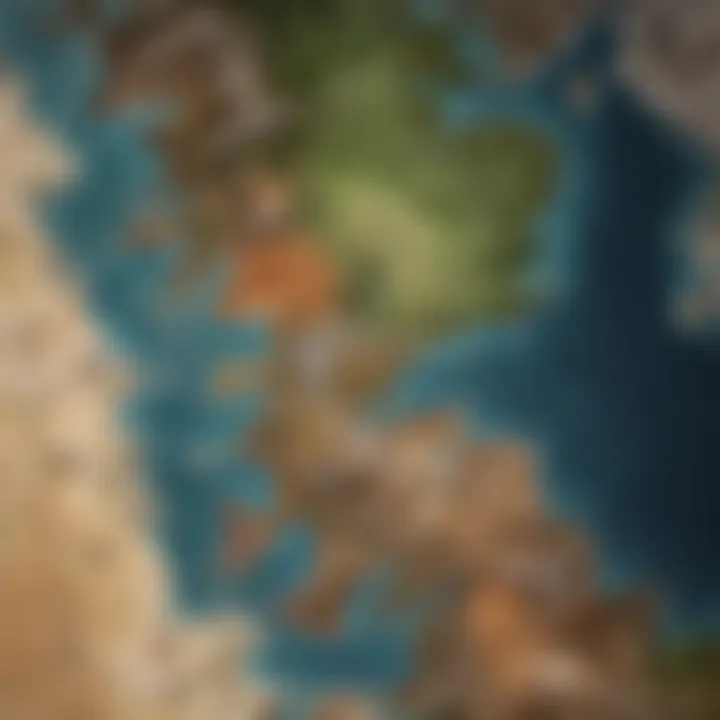Exploring Names of Kingdoms in the Game of Thrones Universe


Intro
The world of Game of Thrones, adapted from George R.R. Martin's A Song of Ice and Fire, is not solely defined by its characters and intricate plots. The names of kingdoms, cities, and regions play a crucial role in building the lore and identity of this richly crafted universe. Each name embodies the history, culture, and social structure of its inhabitants, reflecting not just geographical distinctions but also the political weight they carry.
In this exploration, we dive into the multifaceted names that populate the Game of Thrones universe. From the iconic Seven Kingdoms to the lesser-known territories, the names are laden with significance. Some of them evoke images of strength and nobility, while others remind us of betrayal, conquest, or decline. By uncovering the meanings and implications behind these names, we can gain a deeper understanding of the series’ narrative threads and character motivations.
To enhance our exploration, we will cover the character dissection of key figures who embody these realms, look at relevant lore that nourishes their identities, and perhaps touch on fan theories inspired by the names themselves. Each aspect will contribute to a richer appreciation of how naming influences power and identity in the Game of Thrones narrative. Through this investigation, we hope to illuminate the artistry involved in the crafting of names and the stories they tell.
"A name is a powerful thing. It can echo through the halls of time, shaping destinies and bearing the weight of legacy."
Character Dissections
The characters in Game of Thrones are as varied as the lands they inhabit, each holding a name that is steeped in meaning. Take, for instance, Eddard Stark, whose surname is synonymous with honor and duty. Stark’s character often embodies the principles of the North, a region known for its stoic people and brutal winters. In stark contrast (no pun intended) is Cersei Lannister, whose family name is almost a byword for betrayal and cunning. The Lannisters are steeped in wealth, but also in ambition, leading to their reputation as ruthless players in the game of power.
Gradually, as the series unfolds, we witness how these characters grow and change. For instance, Daenerys Targaryen's journey from an exiled princess to the Mother of Dragons shows the immense weight her name carries—especially in a realm that remembers the fearsome reputation of her ancestors, the dragons. Her name evolves from a mere title to a symbol of hope and rage, embodying the duality of her heritage.
The exploration into names strengthens our grasp of the overarching storyline. Names aren’t just labels; they act as signposts pointing towards the ideologies and histories of their bearers, contributing layers of depth to the characters we grow to love, and in some cases, loathe.
Foreword to Kingdom Names
Naming is a powerful tool in storytelling. Within the Game of Thrones universe, every title holds significance, revealing histories, geographies, and cultural nuances of the realms it represents. It’s not merely about a title; it's about identity, heritage, and sometimes even fate. In this section, we’ll peel back the layers of kingdom names to uncover what they signify in the grand tapestry of Westeros and beyond.
Significance of Naming in Fiction
Names in fiction serve multiple purposes. They can evoke imagery, emotions, and associations. For instance, consider how House Targaryen’s name conjures fire and dragons, a stark contrast to the icy connotations of House Stark. Each name reflects character traits, societal roles, and often foreshadows future events.
- Characterization: Names help define characters. A name like Joffrey Baratheon can bring to mind notions of arrogance and cruelty.
- Symbolism: Names carry deeper meanings than their surface interpretation. The name Dorne resonates with heat and passion, juxtaposed against the cooler temperaments of other regions.
- Cultural Heritage: The richness of the names relates directly to the cultures they represent, like how Iron Islands hints at a rugged, maritime lifestyle, rooted in hardiness and strength.
As we dive deeper into the lore, it becomes clear that each name is a piece of the puzzle, providing insight into the kingdom's ethos and the story's overarching arcs.
Overview of Westeros and Its Realms
Westeros, a land marked by its varying climates and peoples, is divided into distinct realms, each with unique characteristics defined by their names. The Seven Kingdoms, named regions of diverse cultures and histories that reflect the complexity of power dynamics, include the North, the Vale, the Westerlands, and more.
Understanding these areas is essential to grasp their names:
- The North - characterized by its frigid weather and staunch traditions, reflects resilience and strength.
- The Vale of Arryn - known for its natural defenses and lofty castle, symbolizes security against outside threats.
- The Riverlands - a confluence of trade and culture, represents the heart of dissenting kingdoms, serving as a backdrop for political machinations.
- The Reach, rich in agriculture, is noted for its bounty, chivalrous ideals, and captivating beauty.
- Dorne, in contrast, champions a fiery spirit, emphasizing liberty and individualism across its arid landscape.
"In the name lies the essence of a culture, a lineage, a way of life. To understand the kingdom is to understand its name."
As we delve into the exploration of these kingdom names, we will uncover how each contributes not only to world-building but also to the intricate narratives that weave through the Game of Thrones series.
The Seven Kingdoms
The Seven Kingdoms stand as a cornerstone of the Game of Thrones narrative, embodying a mix of political intrigue, unique cultures, and the diverse geographic tapestry of Westeros. This region offers rich insights into the power struggles opposing houses, the nature of alliances, and the complexities of loyalty. The names of these kingdoms are not mere labels; they ignite passion among fans and serve as a portal to deeper understanding of the series' lore. From the icy reaches of the North to the fertile lands of the Reach, the significance of this realm in the broader context of the series cannot be overstated.
The Kingdom of the North
Geographic Significance
The North is often depicted as sprawling and inhospitable, characterized by its rugged terrain and harsh winters. This geographic profile shapes not only the way its inhabitants live but also the narrative arcs that emerge within the series. The key characteristic here is not just its size but its remoteness. The North is perceived almost like a self-contained world, where traditions run deep and survival is a daily struggle.
A distinct feature of this region's geography is the Wall, an enormous structure that keeps the realm safe from threats beyond, particularly from the enigmatic creatures that dwell in the snow. This defensive feature amplifies the sense of isolation and strength, making it a noble choice for the story's background of such events. However, this isolation also presents challenges, as it fosters a certain degree of mistrust towards outsiders, complicating political alliances and interactions with other realms.
Cultural Identity
The cultural identity of the North is robust and vibrant, heavily influenced by the Stark family, known for their honor and loyalty. The key aspect here is that the Northmen pride themselves on their traditions, emphasizing values such as bravery and familial bonds. This cultural backdrop provides a rich exploration of identity within the series.
What’s unique about the North is the strong sense of community, where every family ties their heritage directly to the larger narrative of the Starks. This loyalty offers both advantages and disadvantages—while it fosters unity, it also makes them obstinate in their beliefs and at times resistant to change or outside influences, which adds layers of complexity to their interactions with other regions.
The Vale of Arryn
Defensive Geography
The Vale is shielded by towering mountains, creating natural defenses that contribute significantly to the region's autonomy and survival. Its defensive geography is a remarkable feature since it has historically deterred invasions, allowing its inhabitants to develop a distinct culture relatively untouched by outside forces. The stronghold of the Eyrie, perched high atop a mountain, exemplifies this geographical advantage, also serving as a point of pride for its lords.
The key characteristic of this defensive setup is its exclusivity. While safety is paramount, it also leads to isolation, limiting the Vale's engagement in broader political affairs. This isolation can be both beneficial, in terms of clarity in governance, and disadvantageous, as it creates a disconnect from the rising tensions elsewhere in Westeros.
Noble Traditions
Noble traditions in the Vale are steeped in a history that reflects choice and consequence. The key aspect here is the rigid adherence to chivalry and honor, with lords and ladies maintaining customs that have preserved their way of life for generations. The tradition of the Knighthood, for instance, is paramount, shaping the identity of the Vale’s inhabitants.
A unique feature of these traditions is the moniker often given to its knights—each title reflects not just martial prowess, but personal stories of courage and loyalty. While these practices solidify internal respect and cohesion, they can create tension when faced with external political dynamics, occasionally rendering the Vale too cautious or standoffish in alliances, affecting their role in the unfolding series.
The Riverlands
Role in Tensions


The Riverlands are often described as the heart of Westeros, serving as a battleground for numerous conflicts due to their strategic location. The role this region plays in political tensions is a focal point, as various factions vie for control of the waterways and fertile lands. This area’s foundational characteristic is its interconnectedness, where roads and rivers facilitate both trade and troop movement.
The unique feature here is the historical backdrop of conflicts—houses such as the Tullys and the Freys play integral roles in shaping the narrative. This often results in the Riverlands being on the front lines of power shifts, creating a backdrop rife with intrigue. While this regional tension adds excitement and depth, it also exacerbates the risk of destruction and upheaval, as seen throughout the series.
Civic Life
Civic life in the Riverlands thrives on its diverse communities and shared experiences, a unique aspect that reflects a blend of cultural influences from neighboring regions. The urban centers like Riverrun stand as symbols of prosperity and survival, drawing inhabitants from various backgrounds and trades. This characteristic creates a unique culture of adaptability and resilience.
However, the robust civic identity has its drawbacks; the ongoing conflicts have led to divided loyalties and sometimes violent confrontations among the inhabitants. Each community has its own nuances, leading to a complex relationship between civic pride and political allegiance, which plays into the larger narrative of the series.
The Westerlands
Gold and Wealth
The Westerlands are synonymous with wealth, a key feature that shapes the entire region's significance in the political landscape of Westeros. Home to House Lannister, whose fortress at Casterly Rock commands substantial respect, this region's wealth from gold mines undoubtedly attracts aspiration and envy from other kingdoms. The core characteristic here is resource abundance, allowing for military and political power to consolidate effectively.
A unique advantage of its wealth lies in the power dynamics it influences. The Lannisters’ gold enables not merely luxury but also strategic alliances, shaping narratives around control and influence. However, this wealth also incites jealousy and hostility from rival houses, fueling conflict throughout the series and impacting relationships across the realm.
Impact on Power Dynamics
The inherent wealth of the Westerlands directly affects its power dynamics, positioning House Lannister as a formidable player in the game. They leverage their financial resources to assert dominance, demonstrating how money plays a pivotal role in politics. The primary characteristic of this influence is its ability to bend rules and create opportunities for deception or manipulation.
What is unique about this dynamic is the fragile balance of power; while wealth brings strategic advantages, it also fosters animosity from less affluent kingdoms. Such tension creates a fertile ground for plots and counter-plots, reflecting the underlying theme of ambition and betrayal that resonates throughout the series.
The Reach
Culinary and Agricultural Abundance
The Reach is known for its fertile lands and culinary variety, serving as a cornerstone for sustenance in Westeros. The key aspect of this region's description is its agricultural wealth, which has allowed it to become a breadbasket for the realm. The unique varieties of crops and rich flavors from local produce enhance the culinary scene, attracting admiration and desirability.
Its abundance provides significant advantages for the inhabitants, leading to flourishing towns and robust trade. Conversely, such wealth can create competition among ambitious houses, particularly during times of scarcity elsewhere in Westeros. This duality reflects the complexities of abundance in a power-hungry landscape.
Chivalric Culture
Chivalric culture truly flourishes in the Reach, where knights and nobility celebrate honor and nobility. The key characteristic here is the prevalence of tournaments and the pursuit of courtly love, making it a realm of romance intertwined with honor. The customs specific to this area reflect a deep commitment to ideals of honor and loyalty.
What sets the Reach apart is how these cultural celebrations strongly influence social hierarchy and prestige among the houses. While fostering camaraderie and unity, this chivalric culture can also lead to rivalries and conflict, especially as external pressures mount from competing houses trying to gain favor or influence among the nobility.
Dorne
Cultural Differences
Dorne stands out distinctly from the other kingdoms in terms of culture and customs. The primary aspect of cultural differences comes from its unique social structure, heavily influenced by the harsh climate and geographical barriers. The Dornish are known for their free-thinking attitudes toward gender roles and personal expression, a sizable deviation from the more traditional norms found in the rest of Westeros.
This cultural identity can serve as a double-edged sword; while it fosters innovation and acceptance, it also creates tensions with more conservative regions. Dorne's distinct cultural fabric enhances the overall narrative richness, offering a contrasting view on societal norms present in Game of Thrones, and pushes discussions around political alliances and familial ties.
Political Maneuvering
The political maneuvers in Dorne illustrate its cunning nature. The key characteristic here is strategic thinking, where alliances are formed under layers of discretion and secrecy. The Dornish lords leverage their unique position and culture to gain power, often quietly orchestrating their objectives while appearing less involved in the broader conflicts in Westeros.
The advantage of such political agility lies in its long-term effectiveness; they often remain a step ahead of more brazen political players. However, this stealthy approach sometimes leads to distrust or misunderstanding when interacting with other houses, illustrating how cultural elements can shape political dynamics significantly.
King's Landing
Capital's Role
King's Landing serves as the nerve center of power in Westeros, where key decisions affecting the entire realm are made. The capital's role is monumental, embodying authority and grandeur, yet also chaos and conflict. Its primary characteristic, functioning as a melting pot of ambition, makes it an ideal setting for political drama.
The unique feature worth observing is the physical structure of the Red Keep and the Iron Throne itself; these symbols become pivotal in the quest for power. However, the concentration of power also breeds tension and competition among the nobility, leading to conflicts that arise within its very walls, often impacting the wider narrative.
Symbolism of Power
The symbolism associated with King's Landing resonates throughout the Game of Thrones narrative. The capital's architecture, especially the Iron Throne, represents the ultimate prize in Westeros—the seat of power. Its defining trait lies in how it both inspires and terrifies those who seek it.
King's Landing's unique symbolism encapsulates not only aspirations but also the stark realities of power—betrayal, ambition, and the heavy price of the throne. This duality serves to amplify both the allure and the danger of the political landscape, significantly impacting the story's development.
Beyond the Seven Kingdoms
Exploring the concept of kingdoms beyond the classic Seven Kingdoms provides a rich narrative vein that's often overlooked in discussions surrounding the Game of Thrones universe. These realms expand the world-building efforts of the series, showcasing diverse cultures, histories, and political climates. Names of these kingdoms are not just labels; they reveal intricate histories and offer insights into the identities that people carry.
The importance of delving into these realms lies in how they enrich our understanding of the entire narrative fabric, providing depth and complexity. By considering kingdoms beyond the familiar, we challenge and expand our perceptions of power and identity within the universe.
Essos
Free Cities and Their Names
The Free Cities of Essos stand out as vibrant melting pots of culture and commerce. Each city boasts its own unique name that often hints at its historical significance or predominant characteristics. Take, for example, Braavos, a city built on islands, whose name invokes a sense of depth and resilience, reflecting how it has thrived against tides of adversity.


These cities often derive their names from languages, folklore, or prominent historical events, which further enhances their individuality. This characteristic makes discussing Free Cities and their names a beneficial choice in our exploration. Their unique features help readers appreciate the intricate details embedded in their narratives, making names a window into the cities' souls.
Cultural Influences on Naming
When we analyze Cultural Influences on Naming in Essos, it becomes clear that the diverse tapestry of the region contributes significantly to the names of its locales. Drawing inspiration from ancient cultures, trade, and even mythology, these names tell stories that intertwine with the cities’ identities. For instance, the name Meereen harbors connotations of both grandeur and past strife, resonating with the longstanding struggles between various cultures.
This aspect is crucial to understanding naming conventions, as it underscores how history and culture intertwine. The unique feature of layered cultural references in naming brings forth a rich narrative that serves as a background tapestry, adding both depth and texture to the storytelling.
The Iron Islands
Naming Conventions
In the Iron Islands, naming conventions are steeped in heritage and signify a fierce maritime culture. Names often reflect the characteristics of the harsh environments the islanders inhabit. The name "Pyke" resonates with strength and solidarity, emulating the rugged cliffs that rise defiantly against the stormy seas. This method of naming is not just beneficial for identifying places; it also connects the identity of its inhabitants with their environment.
These conventions give insight into the Ironborn's values, and how they see themselves within the broader narrative. Thus, naming conventions become a crucial focal point in understanding their storytelling.
Maritime Lifestyle
The maritime lifestyle of the Iron Islands also significantly influences the region’s names. The ocean’s hand shapes both the land and its people, leading to names that conjure images of bravery and ferocity against the backdrop of tumultuous waves. Locations like Old Wyk carry with them tales of sailors, battles, and conquests—naming that reflects the hardy spirit necessary for survival in such conditions.
Recognizing the uniqueness of this lifestyle's representation through names allows readers to grasp the essence of Ironborn culture. It emphasizes an awareness that these names aren't just geographical markers; they encapsulate an entire way of life.
Qarth
Mystique of Location
Moving eastward, Qarth emerges as an enigmatic location, crucial to the narrative. The name itself suggests a sense of mystery and grandeur, evoking a mix of awe and trepidation. It sits at the crossroads of trade routes, making it a melting pot of ideas and cultures. This positioning is key to its identity in the storytelling.
The actual geographical and cultural makeup of Qarth adds layers to this concept. Its unique waterside location serves not just as a backdrop for the tale, but as a character in its own right, pushing the narrative forward with its allure and dangers.
Cultural References
The cultural references embedded within Qarth are another compelling angle. The city is often associated with powerful traders and aristocracy, and its name has connotations of wealth and exotic wonders. This reflects the aspirations and struggles of those who find themselves entwined in its narrative, enhancing its appeal in the broader context of naming.
By dissecting such cultural references, we can gain a more profound grasp of what Qarth represents. It's not merely a locale; it's a reflection of ambition and the often dangerous game of power.
Valyria
Historical Legacy
Valyria's history is shrouded in myth and tragedy, which is poignantly captured in its name. Evoking tales of lost civilizations and immense power, Valyria serves as a stark reminder of the past's hold over the present. Its legacy, particularly the ruins and legends left behind, offers a vast wealth of context that deepens the narrative.
Understanding this historical legacy is essential, as it's a critical aspect of the Game of Thrones lore. Names like Valyria carry echoes of ancient practices and catastrophic events, giving readers a sense of warning and reverence.
Linguistic Roots
The linguistic roots behind Valyria's name also merit attention. Drawing from complex languages, the name itself is a tribute to the diverse cultures that once flourished there. This aspect adds another critical piece to the puzzle, highlighting how language can reflect cultural identity and historical evolution.
Exploring linguistic roots, we uncover how rich and varied the histories can be, and how important names are as artifacts of culture. They serve as a lens through which the nuances of identity and the passage of time can be observed.
Ultimately, tackling these aspects of kingdoms beyond the Seven Kingdoms furthers our understanding of the rich, multilayered narrative woven throughout the Game of Thrones universe.
Symbolism and Connotations
In the realm of the Game of Thrones universe, names carry deep symbolism and connotations that go well beyond mere designations. They reflect power dynamics, cultural identities, and historical contexts fastened to the lore. The way a kingdom is named not only establishes its identity but also evokes feelings that can sway allegiances. Names encapsulate legacies of their cultures, shaping the narrative and suggesting relationships among the various regions in Westeros and beyond.
Therefore, understanding the symbolism embedded in these names enhances the appreciation of the intricate world-building in the series. It opens windows to see how names influence perceptions, emotions, and even conflicts. This section aims to dissect the role of names in conveying power and historical references within the Game of Thrones narrative.
The Power of Names
"A name is a powerful thing; it carries the weight of identity, tradition, and often, destiny throughout the layers of a narrative."
Control and Influence
The names of kingdoms in the Game of Thrones universe serve as tools of control and influence. By naming a kingdom, one may inadvertently shape how it is perceived, both by its inhabitants and outside forces. A name can invoke fear, inspire loyalty, or create animosity. For instance, King’s Landing suggests a city of power and prominence, echoing the need for authority within its walls. The weight of control conveyed through a name can make it a strategic advantage.
A beneficial aspect of this concept is how recognition serves to rally its citizens, or to intimidate adversaries. Dorne, with its exotic allure and noble background, is often seen as a place of mystery and rebellious spirit. However, the disadvantage lies in how the connotation of a name can sometimes trap a kingdom within its narrative confines, limiting its evolution.
Narrative Implications
Names also hold significant narrative implications. They help in establishing tone and context. The name The Night's Watch conveys a solemn commitment to duty, marking a group of men dedicated to defending the realm against the unknown. In this way, names can evoke an emotional response from audiences, allowing them to connect with histories and struggles.
Furthermore, the unique feature of narrative implications is their potential to foreshadow events or themes within the story. The name The Golden Company, for example, encapsulates the mercenary group’s ambition for wealth and influence, setting the stage for future conflicts. Yet, one risk cannot be overlooked—ultimately, the strength of such implications relies on how well they are woven into the overarching plot.
Names Reflecting History
Names are often the backbone of a culture's history and heritage, carrying forward legacies of the past into the present.


Ancient Legacies
Exploring ancient legacies reveals an intrinsic connection between names and their historical significance. Take Valyria, for instance; the name evokes images of a once-great civilization steeped in magic and might, famous for its dragons and craftsmanship. The very mention of Valyria invokes a sense of tragedy, lost grandeur, and an era that shaped the fate of Westeros. This characteristic of deep-rooted history makes it a compelling choice for this article, as it underpins the very essence of how the remnants of the past influence the present.
One key advantage of highlighting ancient legacies lies in their ability to deepen the audience's engagement with the lore. However, one must tread carefully, as the burden of legacy can also shack those influenced by it if they struggle to break free from its shadows.
Cultural Evolution
Cultural evolution is another significant aspect of names, illustrating how they adapt and change over time. House Stark, for example, reflects the values of its house through its name, which signifies stark honesty and resilience against the harsh northern climate. As the series unfolds, the interpretation of "Stark" evolves, reflecting the house’s changes in fortunes and attitudes.
The advantage of exploring cultural evolution is the insight it provides into the shifting dynamics within the narrative. While some names, like Dorne, may signify steadfastness and unique traditions, others may hint at impending transformations that alter a kingdom's identity. The downside, however, is the danger of losing authenticity as names reshape their meanings over time.
Ultimately, examining the symbolism and connotations of the names throughout the Game of Thrones universe enriches our understanding of its complex world. By delving into the power of names, reflecting on historical legacies, and observing cultural evolution, we grasp not just the essence of the kingdoms but also their significant role within the tale's broader narrative.
Case Studies of Unique Kingdom Names
The study of kingdom names in the Game of Thrones universe is not just an exercise in semantics, but a window into the very essence of the societies that inhabit this complex world. Through examining specific names, we gain insights into cultural context, historical significance, and even socio-political dynamics. By analyzing case studies such as The Night's Watch, The Golden Company, and House Stark, readers can appreciate how names serve both as identifiers and as rich vessels of meaning within the broader narrative of the series.
The Night's Watch
Significance of the Name
The term "The Night's Watch" carries weighty significance. It conjures an image of vigilant protection and longstanding duty. This name doesn’t merely label an institution; it encapsulates the gravity of their mission. The watchmen are tasked with guarding not just a wall but humanity itself, against various threats that lie beyond. It’s a compelling choice that evokes the darkness they confront, emphasizing both peril and resolve.
The key characteristic here is the blend of nobility and anonymity. These brotherhood members are sworn to a life of celibacy and duty, often shunned by society. Thus, the name's collective nature fosters a sense of belonging, while also highlighting the solitary burdens each member carries. By invoking “Night,” there’s also an air of mystery and foreboding, possessions often associated with nobility of sacrifice under dire circumstances.
Role in the Series
In the narrative, The Night's Watch is quite literally a bulwark against chaos. Their presence affects the political landscape of Westeros significantly, often acting as a neutral ground for various factions. The role of the Night's Watch extends beyond mere defense; they become metaphorical representations of duty anytime conflicts between houses flare up.
The unique feature of this narrative role is its duality: they are both protectors and outcasts. Their name reflects their purpose; however, as the story unfolds, newer layers complicate their initial impression, making their ultimate fate a profoundly impacting element in the saga. The name indeed lends itself to deeper thematic explorations of honor, sacrifice, and the often-unseen battles that shape history.
The Golden Company
Origins of the Name
The name "Golden Company" presents a striking juxtaposition: wealth wrapped in military ambition. It originates from the allure of gold, indicating prosperity and ambition among mercenary forces. The primary aspect of this moniker is its promise; it signifies both riches and loyalty, which are rare commodities in warfare. Its benefit lies in the immediate recognition of the group’s prowess and ambitions, stoking legends around this organization.
The allure of the word "golden" not only encapsulates the tangible but also connects to ideas of honor and glory within the realm of mercenarism. This impact ripples through the series, illustrating how names can encompass hope while burdening characters with high expectations.
Impact on Warfare
The Golden Company's influence in warfare cannot be understated. Its name alone often strikes fear or hope into the hearts of those who hear it. By positioning itself as a lucrative option for disgraced nobles and ambitious leaders, the company disrupts traditional warfare dynamics in Westeros. The recruitment of this troop exhibits how names can lend credence to military endeavors, often altering alliances and the courses of conflicts.
This unique trait makes the company a pivotal player in the shifting allegiances of the world. The name, filled with grandeur, contributes to a sense of endless possibilities, but it also delves into the moral quandaries of employing mercenaries. As a result, its emergence changes the figure of legitimate power into one marred by economic motivations.
House Stark
Meaning of 'Stark'
House Stark’s name is powerful. "Stark" embodies not only a surname but a notion of fortitude and resilience. The very sound of it evokes solidity, steadfastness, and, perhaps, the chilly demeanor of the North where they hail from. This connotation aligns with their reputation as defenders of justice and loyalty to their people, offering readers a seamless connection between title and character identity.
This strong association serves the narrative well; it heightens the emotional stakes tied to their journey. Through trials and tribulations, the name maintains an aura of dignity, even when faced with unfathomable loss. Members of House Stark are often ideals of honor and moral compass within the chaotic events of the series, providing essential depth to their storyline.
Identity and Honor
The identity tied to House Stark is steeped in honor, loyalty, and morality, serving as guiding principles. Stark members are charged with the heavy weight of preserving their family values, as reflected in the Stark motto, "Winter is Coming." This phrase forecasts a harshness inherently linked to their identity, shaping not just their decisions but also their relationships with other characters.
This linking of name with identity presents a solid foundation for narrative exploration. However, it also highlights the tension between individual desires and family obligations. While their name promotes a sense of community, it also chains them to specific expectations, weaving a rich tapestry of conflict and integrity throughout the series.
Key Takeaway: The power of names in the Game of Thrones universe is integral to understanding character motivations, socio-political dynamics, and thematic developments. Exploring these case studies illuminates the thought and philosophy embedded within each carefully chosen title.
Epilogues on Naming in Game of Thrones
Naming serves as a powerful vessel within the Game of Thrones narratives, transcending mere identification to carry deep-rooted implications for power, identity, and cultural heritage. The names of kingdoms are not just labels; they reflect the very souls of their realms. In the show, a name can signal heritage, influence alliances, and even dictate the fate of entire peoples. Therefore, understanding their significance provides a window into the rich, complex world crafted by George R.R. Martin.
Impact on Narrative and World-Building
The names themselves play a pivotal role in shaping the overarching narrative of the story. Each name springs from a well of historical context that informs character allegiances and conflicts. For example, House Stark evokes a sense of resilience and honor, a nod to the North's harsh winters and steadfast traditions. On the flip side, names like Lannister carry connotations of wealth and ambition, laden with historical significance rooted in the region's mining wealth.
When viewers hear Dorne, they immediately think of a place where passion and intrigue flourish, punctuated by warm climates and a culture that embraces freedom and independence. This diversity in naming leads to an immersive world where geographical and cultural elements shape the stories told. The distinct auditory quality of these names becomes integral to the storytelling experience, helping audiences to visualize and differentiate various realms effortlessly.
"A name does more than represent; it weaves a narrative that echoes through time and place."
As the show unfolds, the stakes rise and fall in alignment with the connotations inherent in the names of these territories. The tensions between the North and South, represented by Starks and Lannisters, exemplify how names can embody broad cultural divides, enriching character motivations and driving the narrative forward.
Future Considerations in Lore Development
As the lore evolves, future narratives will undoubtedly explore new realms and kingdoms, inviting the need for fresh names imbued with meaning. The art of naming remains an open canvas for creators, providing endless opportunities for cultural expression. Each new name must not only fit within the established lexicon but also reflect the essence of the new kingdom it represents. A land known for its scholars might bear a name reminiscent of wisdom and knowledge, while a fierce warrior society might boast something that evokes strength.
Scholarly explorations of real-world historical influences on names give a rich foundation from which to draw inspiration. Names that encompass elements from languages, history, and mythology can bring entire cultures to life, forging new paths in the narrative.
Communities of fans may also engage in discussions surrounding potential names. Platforms like Reddit serve as venues where creative ideas flourish, and concepts can be tested against fan expectations and knowledge of lore.



